Sure as carbon dioxide and the greenhouse effect, the 2010s are following a standard 20-year nostalgia cycle by embracing the 1990s as their "retro twin" decade. The quiet rumblings of the last few years – student Nineties parties and the reappearance of the crop top – have this year flowered into a full-on revival that has hairdressers fingering their razors (remember the Rachel cut?), thirty-somethings wearing double denim again, and Rambert coming to Sadler’s Wells with revivals from 1990-1 alongside a Merce Cunningham classic from the Nineties’ own retro twin decade, the 1970s.
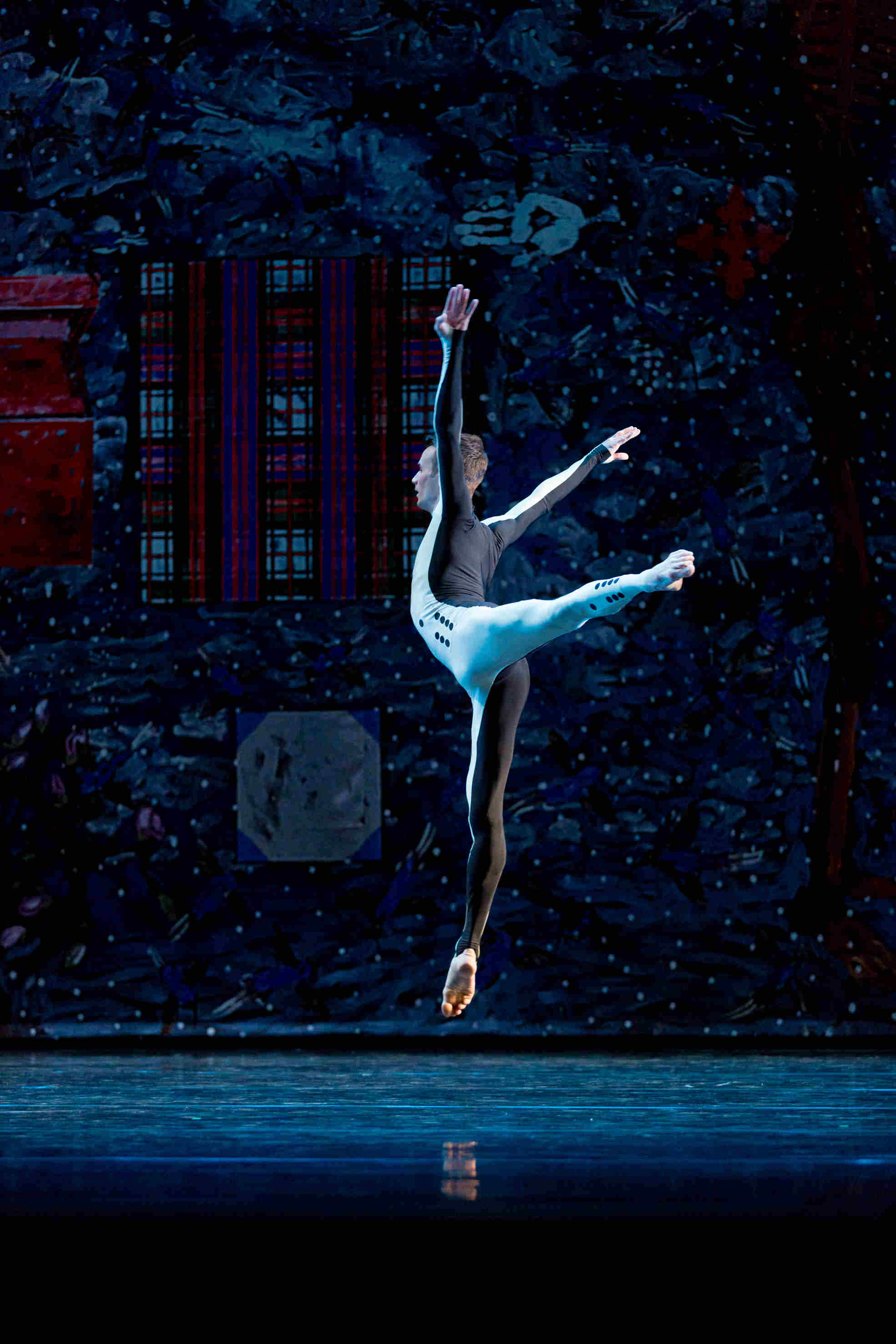 Four Elements (1990), the show’s opener, displays great American minimalist choreographer Lucinda Childs in Wayne McGregor mode – all contemporary music, high-spec visuals, and incredibly repetitive dance vocabulary. The only element to make any lasting impression is "Air", a clever exploration for four men of the boundaries between contemporary and ballet technique through contrasts of walking and leaping, in which Dane Hurst makes sparkling work of Childs’s nifty interrupted/counter-intuitive turns. The rest is same-old same-old in Childs’s extra-balletic, straight-limbed Cunningham style, at its best coolly elegant (in the hands of Royal Ballet School products Adam Blyde, pictured right, and Hannah Rudd), but often just mechanical. With little aid offered by Gavin Bryars’s colourless score, its low woodwind notes indistinguishable as raindrops through a fogged-up window, or Jennifer Bartlett’s colourful but dated acrylic designs (all those playing cards just reek of James Bond title sequences), this is at best a soothing, at worst a snoozing, 30 minutes.
Four Elements (1990), the show’s opener, displays great American minimalist choreographer Lucinda Childs in Wayne McGregor mode – all contemporary music, high-spec visuals, and incredibly repetitive dance vocabulary. The only element to make any lasting impression is "Air", a clever exploration for four men of the boundaries between contemporary and ballet technique through contrasts of walking and leaping, in which Dane Hurst makes sparkling work of Childs’s nifty interrupted/counter-intuitive turns. The rest is same-old same-old in Childs’s extra-balletic, straight-limbed Cunningham style, at its best coolly elegant (in the hands of Royal Ballet School products Adam Blyde, pictured right, and Hannah Rudd), but often just mechanical. With little aid offered by Gavin Bryars’s colourless score, its low woodwind notes indistinguishable as raindrops through a fogged-up window, or Jennifer Bartlett’s colourful but dated acrylic designs (all those playing cards just reek of James Bond title sequences), this is at best a soothing, at worst a snoozing, 30 minutes.
After that, Christopher Bruce’s Rooster (1991) should function as a pick-me-up – it’s set to eight Rolling Stones songs, for goodness’ sake! Bruce’s intention was to translate his affection for these sounds of his youth into a (humorous) dissection of the casual chauvinism of that culture. But as social commentary, Rooster is sub-Grease, copying many of that musical’s situations (the trio of mean girls, the male posturing, the partner-swapping dance-off) but failing in one important respect where Grease succeeded: giving the women faces to remember.
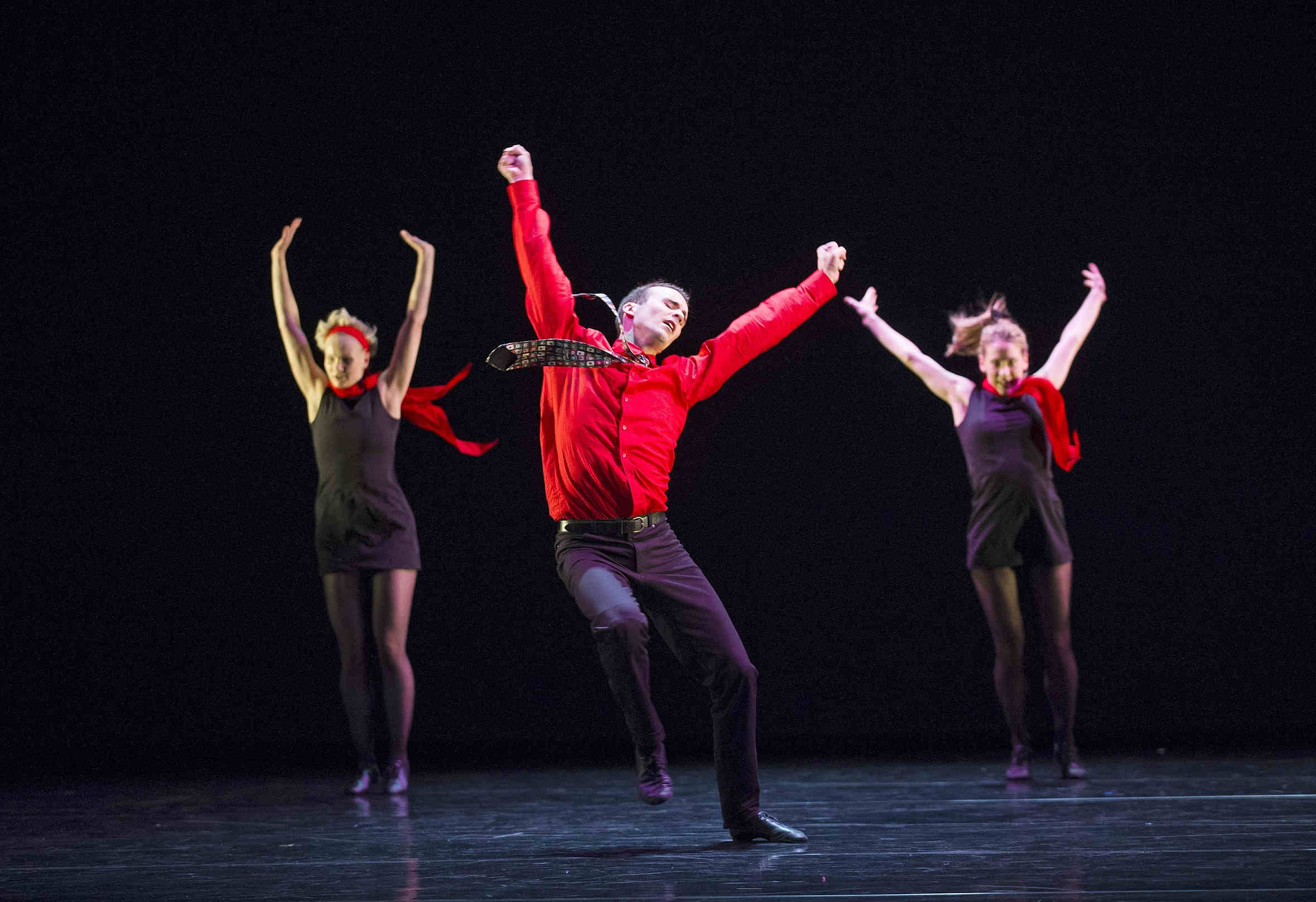 The girls in Rooster wear identical (grim) black and red tennis dresses (pictured left) and struggle to establish personalities for themselves, while the grinning, swaggering men in differently coloured shirts are allowed to be characters whom the audience can recognise and reward with extra applause at the curtain call – cocky, flashy Miguel Altunaga (vying with Dane Hurst for the John Travolta honours), or confused, aggressive Stephen Wright (channelling Kenickie). All the funny, zingy moments belong to the men, Altunaga’s rooster imitations and tie adjustments (pictured below right) top among them, while the choreography in the Ruby Tuesday solo, danced as spirited and vulnerable by Antonette Dayritt in a long peasanty dress (better than Olivia Newton-John) only gets really exciting when she’s tossed bodily in the air by her partners. Judging from the audience’s reaction, mine is a minority opinion, but while it’s all good fun and easy to watch, I can’t see how - unless you worship the Stones, or have never seen Grease – Rooster is any more than pretty bland light entertainment.
The girls in Rooster wear identical (grim) black and red tennis dresses (pictured left) and struggle to establish personalities for themselves, while the grinning, swaggering men in differently coloured shirts are allowed to be characters whom the audience can recognise and reward with extra applause at the curtain call – cocky, flashy Miguel Altunaga (vying with Dane Hurst for the John Travolta honours), or confused, aggressive Stephen Wright (channelling Kenickie). All the funny, zingy moments belong to the men, Altunaga’s rooster imitations and tie adjustments (pictured below right) top among them, while the choreography in the Ruby Tuesday solo, danced as spirited and vulnerable by Antonette Dayritt in a long peasanty dress (better than Olivia Newton-John) only gets really exciting when she’s tossed bodily in the air by her partners. Judging from the audience’s reaction, mine is a minority opinion, but while it’s all good fun and easy to watch, I can’t see how - unless you worship the Stones, or have never seen Grease – Rooster is any more than pretty bland light entertainment.
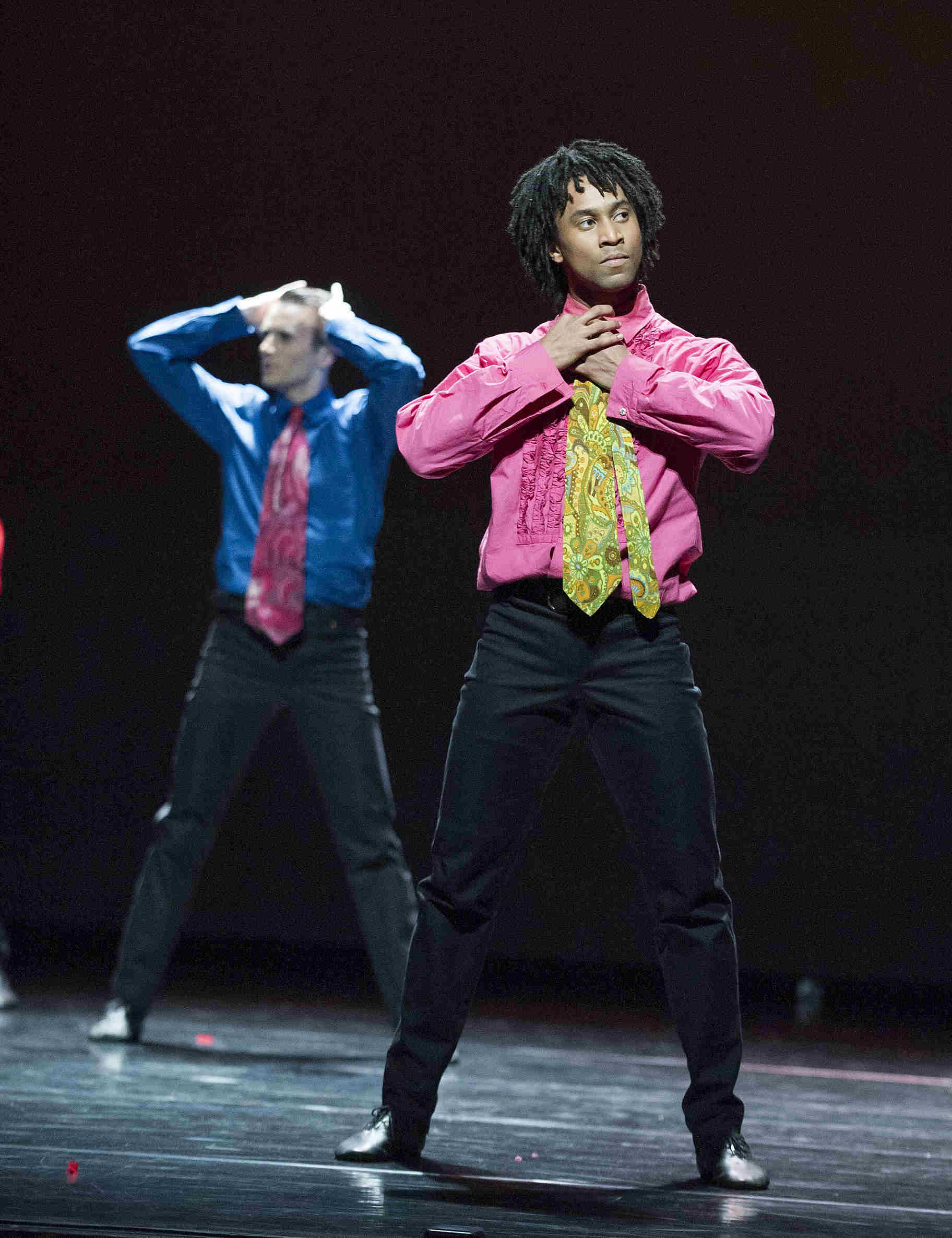 Next up, like a palate-clearing sorbet, is Richard Alston’s Dutiful Ducks (1982), a soap-bubble brief solo for Dane Hurst that returns to the more formalist style of Four Elements. I liked the tics of movement that ripple through his body but I liked even more what they were responding to: the startlingly effective “text-sound composition” that is Charles Amirkhanian’s 1977 score, mostly a sardonic/insistent repetition of the titular words (fortunately with American pronunciation - “dootiful ducks” - for maximum alliterative effect).
Next up, like a palate-clearing sorbet, is Richard Alston’s Dutiful Ducks (1982), a soap-bubble brief solo for Dane Hurst that returns to the more formalist style of Four Elements. I liked the tics of movement that ripple through his body but I liked even more what they were responding to: the startlingly effective “text-sound composition” that is Charles Amirkhanian’s 1977 score, mostly a sardonic/insistent repetition of the titular words (fortunately with American pronunciation - “dootiful ducks” - for maximum alliterative effect).
Merce Cunningham’s Sounddance (1975) is a chance finally to see the cool, linear style in the hands of one of its masters (main picture). Perhaps because I was in the balcony, I was struck most in the first moments not by dancing but by sound. David Tudor’s score really did seem to dance between speakers, draping, looping, and lacing the auditorium in auditory sheets made up of birds, bubbles, thunder and countless things besides, a rainforest cacophony of electronic noise. There is draping, looping and lacing on stage, too: Cunningham’s formations are relentlessly mobile, and endlessly inventive – a world away from the constricted lines of Four Elements.
Rambert dancers are formidably good, and particularly in the exacting choreography of Childs and Cunningham – their training firm, but their human faces shining through. It’s just a pity Bruce’s Rooster is not the worthiest material for those intelligent, expressive dance minds; I would have loved to see something of comparable depth sitting alongside Sounddance.
- Rambert is at Sadler's Wells with this triple bill until 24 May.




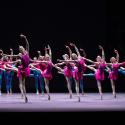
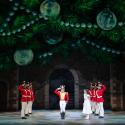
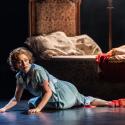







Add comment